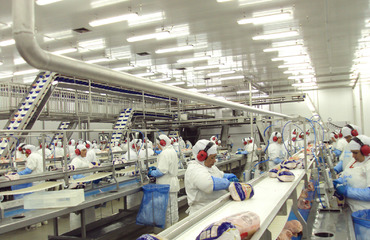São Paulo – After a year of strong growth, Egypt is once again among the most promising markets for Brazilian poultry exports in 2017. So says Ricardo Santin, the vice president and markets director with the Brazilian Animal Protein Association (ABPA). Even though Egypt’s government changed back the decision made two weeks ago to exempt whole frozen chicken from taxes, the socioeconomic conditions are inviting to product from Brazil.
From January to November Egypt imported 92,000 tons of poultry from Brazil, up 45.8% from the same months last year. Of all Arab importers of Brazilian poultry, Egypt was the only one whose purchases went up – exports to Saudi Arabia, the United Arab Emirates and Kuwait all dropped.
“The return of US dollars into the economy, with the unpegging of Egypt’s pound, will drive up imports. And even the government itself is working to reduce food prices in the country,” said Santin.
Besides Egypt, the ABPA executive cited Libya, Jordan and Kuwait as Arab destinations with a promising outlook for sales next year. Regarding export volume, even though its imports were down 9% through novembro, Kuwait purchased more poultry than even Egypt itself – 100,000 tons.
Exports to the United Arab Emirates dropped by 1.3% to 273,000 tons. Saudi Arabia, the leading buyer of Brazilian poultry, bought 3.9% less at 80,000 tons.
“The Middle East sales slump is natural, and it has to do with the market’s consumption levels,” explained ABPA president Francisco Turra. “I believe it has a bit to do with fluctuations in oil prices. Once the price goes up, usually so does demand, but the opposite also holds true,” he pointed out.
Santin added that another factor in Saudi Arabia’s case is an increase in domestic production. “Half of the demand for poultry is met through local production, and the other half is imported from Brazil,” he explained.
Results
Another reason for the drop in exports to the Middle East is Brazilian poultry output. ABPA data shows local industry production will be down 1.8% from last year to 12.9 million tons by the end of this year. This was imputed to the economic crisis, which burdens some companies – some have even shut down plants – and causes demand to diminish.
“There are 12 milllion people unemployed and the country is in the throes of recession. The result was less protein on Brazilians’ tables,” concluded Turra.
By year’s end, exports will have widened by 2% to 4.39 million tons over last year, driven by the Asian continent – especially China, which imported USD 451,000 tons through November, a 62.9% increase over the comparable period in 2015, and became the second biggest buyer of poultry from Brazil.
Through November, poultry exports were up 3% to 4 million tons.
The ABPA expects both production and exports to increase by 3% to 5% in 2017.
*Translated by Gabriel Pomerancblum




